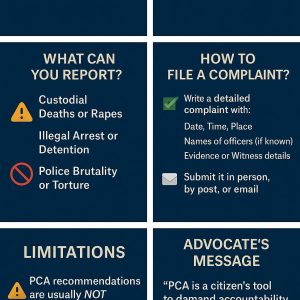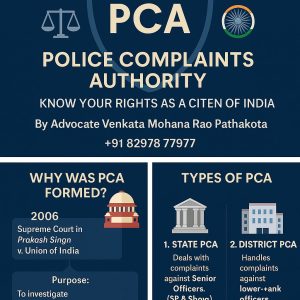
Understanding the Police Complaints Authority (PCA) in India
Posted on July 12, 2025
📜 Understanding the Police Complaints Authority (PCA) in India
✍️ By Advocate Venkata Mohana Rao Pathakota
📞 +91 82978 77977
As citizens, we often ask: Where can we seek justice when those who are meant to protect us—fail us?
The Police Complaints Authority (PCA) was constituted to answer that very question.
🔹 Background:
In 2006, the Supreme Court of India, in the landmark Prakash Singh vs Union of India case, issued binding directions to reform police functioning. One major directive was the establishment of Police Complaints Authorities at both the State and District levels to investigate police misconduct.
⚖️ Purpose of the PCA:
The PCA serves as an independent body to address public grievances against the police, especially involving:
Custodial deaths
Custodial rapes
Grievous hurt while in police custody
Illegal arrest or detention
Police corruption, extortion, or abuse of authority
🏛️ Structure:
1. State Police Complaints Authority
Handles complaints against officers of the rank of SP and above
Usually chaired by a retired High Court judge
Includes civil society representatives
2. District Police Complaints Authority
Handles complaints against junior officers (below SP rank)
Typically chaired by a retired District Judge or civil servant
🔍 Functions & Powers:
Receive complaints directly from victims, their families, or any other person.
Conduct independent inquiries (with power to summon witnesses, call for documents).
Recommend disciplinary or criminal proceedings against erring police officials.
Submit annual reports to the government.
⚠️ Note: PCA recommendations are not binding, but they hold strong persuasive value and help build public pressure for justice.
📝 How to File a Complaint:
Complaints can be filed in writing, by post, email, or in person.
Some states have websites or helplines (though implementation varies).
Attach evidence, witness details, and specifics of the incident.
🚨 The Reality:
Though mandated by the Supreme Court, many states have not fully implemented the PCA structure. Where it exists, lack of awareness, political interference, and limited powers affect its functioning.
📣 Conclusion:
As an advocate, I believe public awareness and active civic participation are vital to make policing more accountable and humane. The PCA, if strengthened and properly implemented, can be a powerful tool for justice.
Let’s not forget:
> “A police force that is not accountable to the rule of law is a threat to democracy itself.”
Article Written by
Pathakota Venkata Mohana Rao B.Com, LL.M
Advocate at Supreme Court and High Court of Andhra Pradesh and Telangana
Designated Partner at VENSO LAW OFFICES LLP
Office No: +91 967 967 6450
E-mail ID: vensolawofficesllp@gmail.com
hashtagPoliceComplaintsAuthority hashtagKnowYourRights hashtagPoliceReforms hashtagAdvocateVenkataMohanaRao hashtagHumanRights hashtagRuleOfLaw hashtagCustodialJustice hashtagLegalAwareness



